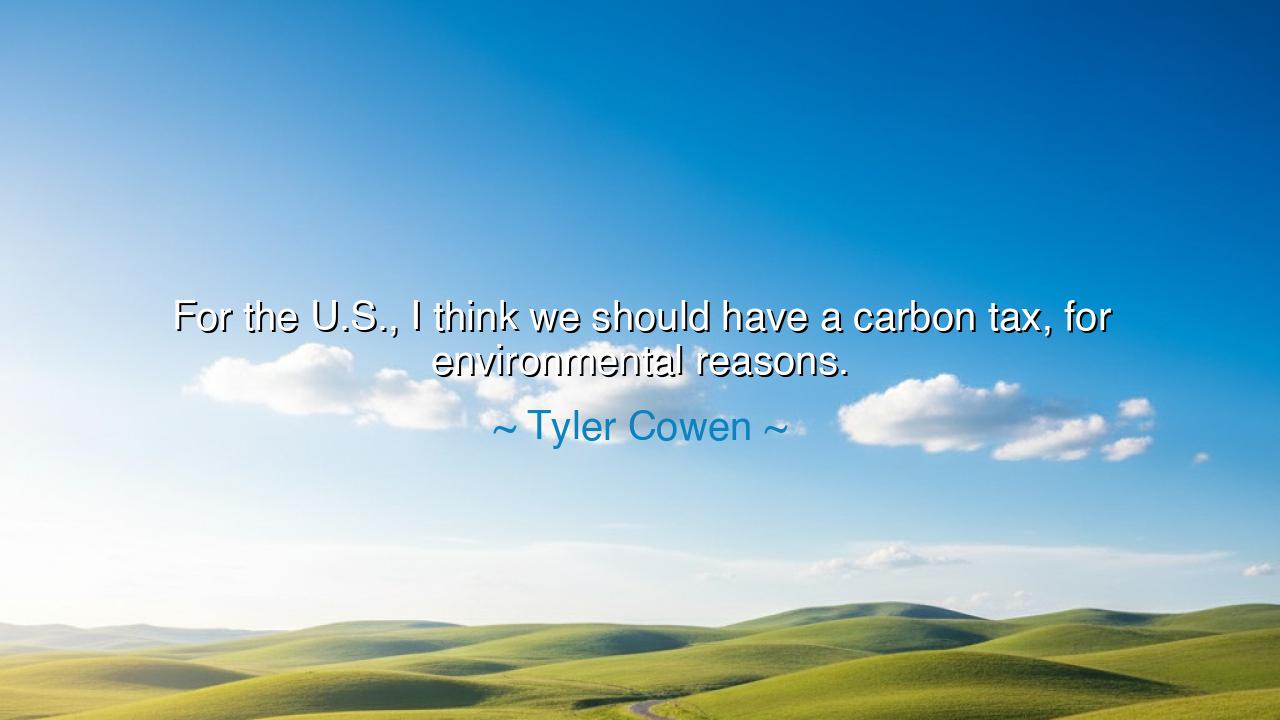
For the U.S., I think we should have a carbon tax, for






The words of Tyler Cowen—“For the U.S., I think we should have a carbon tax, for environmental reasons.”—though simple in form, carry the weight of a civilization’s conscience. Beneath their calm, rational tone lies a call to moral awakening: a recognition that prosperity without responsibility becomes decay, and that the time has come for humanity to pay not only for what it builds, but for what it burns. Cowen, an economist by trade and philosopher by inclination, speaks not merely of taxation, but of balance—a principle as ancient as the universe itself. His call for a carbon tax is, at its heart, a call for justice: justice for the earth, for the generations unborn, and for the sacred equilibrium that sustains life.
To understand his words, one must first understand the nature of carbon, the invisible spirit of both life and destruction. It is the element that flows through our breath, our soil, our oceans—and yet, when unleashed without restraint, it becomes a shroud that traps heat and suffocates creation. The ancients would have called it hubris: mankind’s desire to conquer the elements without regard for consequence. Cowen’s wisdom lies in seeing that economics, though measured in numbers, must bow before the laws of nature. To tax carbon is not to punish progress—it is to remind progress of its limits, to reforge the bond between economy and ecology, two words that share the same ancient root: oikos, meaning “home.”
History has shown that civilizations fall not when they lack wealth, but when they forget stewardship. In the mighty city of Babylon, rivers once ran full and fertile; yet deforestation and overuse turned the land to dust. In Easter Island, the people who carved gods from stone felled every tree that sustained them, until hunger silenced their songs. Each story whispers the same truth: that unchecked consumption is the slow poison of greatness. Cowen’s proposal for a carbon tax is but the modern echo of this eternal warning. It is not a new chain, but a safeguard—a way to ensure that freedom does not devour the world that grants it.
To some, the idea of a tax seems a burden, an intrusion upon the liberty of enterprise. But Cowen speaks from a deeper logic—the logic of equilibrium. When one consumes the planet’s resources without paying their true cost, the debt does not vanish; it accumulates in the skies, in the seas, in the silent migrations of dying species. The carbon tax is not merely an economic instrument; it is a form of atonement, a recognition that every act of creation demands an offering in return. Like the farmers of old who left a corner of their harvest for the poor, this tax is a modern covenant of humility—an acknowledgment that our prosperity must not come at the expense of the earth’s health.
Consider the example of Sweden, a nation that embraced the carbon tax decades ago. At first, many feared it would cripple their economy. Yet the opposite occurred. Industries innovated, citizens adapted, and emissions fell even as prosperity rose. The nation proved that responsibility and growth need not be enemies. Their success shows what Cowen envisions for the United States—a land whose ingenuity, if guided by conscience, could lead the world toward renewal rather than ruin. It is proof that the marketplace, when aligned with moral purpose, can be not a destroyer, but a healer.
The deeper wisdom of Cowen’s words lies in his recognition that environmental care is not charity—it is self-preservation. Every human breath is a loan from the air we share; every meal depends on the soil we inherit. To neglect the environment is to forget our own reflection in the world’s mirror. A carbon tax, then, is not a penalty, but a reminder—a signal that we must weave accountability into our systems, just as we weave honesty into our lives. For the price of pollution is not measured in dollars alone, but in the silent loss of harmony, the fading of the blue and green that cradle us.
And so, the lesson stands firm: those who take from the earth must also give back. Cowen’s call is not a political gesture, but a moral commandment. It asks us to rise above greed, to think not only of profit but of posterity. Let every nation, every citizen, every builder remember this: that progress without restraint is ruin disguised as triumph. To tax carbon is to pay tribute to the air that sustains us, the oceans that cradle us, and the generations who will walk the world we leave behind.
In the end, the quote is not merely about economics—it is about wisdom in stewardship. The ancients taught that every gift from nature bears a sacred responsibility. Cowen’s insight revives that timeless teaching in modern form. Let us, then, heed his call—not as a burden, but as a blessing, for when humanity learns to balance its books with the earth, it will finally prove worthy of its home.






AAdministratorAdministrator
Welcome, honored guests. Please leave a comment, we will respond soon